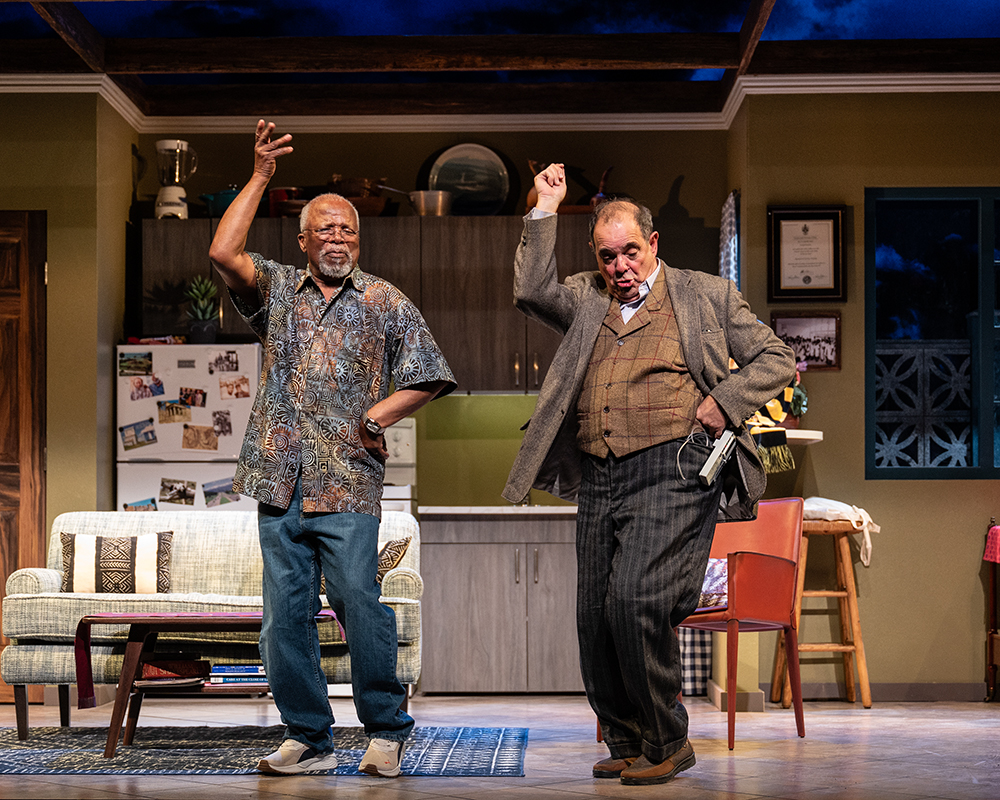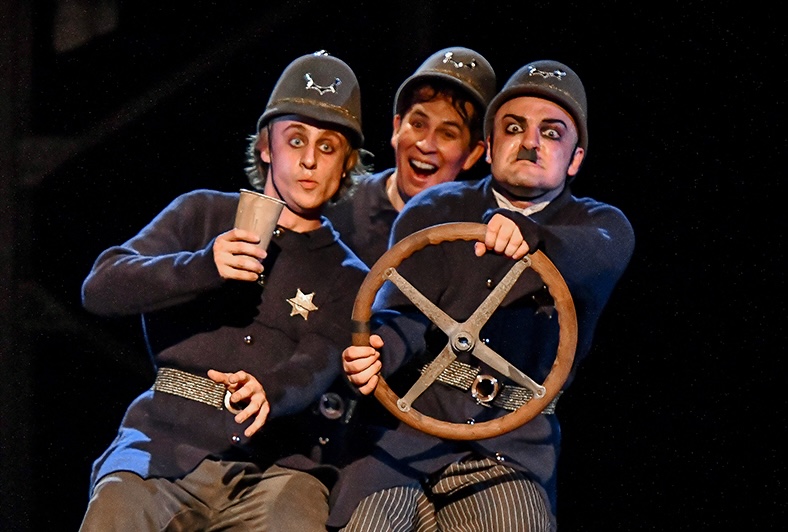‘Grounded’ Review: Operatic Soar
To see Jeanine Tersori's 'Grounded,' at the Washington National Opera, is to be dazzled by concept and execution alike.

Given the prospect of an opera about an American female fighter pilot, you’d be forgiven for envisioning an all-woman version of Top Gun set to a musical theater score. After that subsides, you might then wonder if this is too round a peg trying to fit into too square a hole.
And yet to see Jeanine Tersori’s Grounded, a co-production with the Metropolitan Opera, is to be dazzled by concept and execution alike. Here is opera — that wonderful, powdered, and bewigged confection of an artform — delivering on a story that could be ripped from the headlines. And deliver it does.
Innovating masterfully with LED-screen technology, this is an immensely visual experience: there is the boundless flight of a war jet, the eternal agitation of a targeting grid, the expanse of a Nevada highway, the monstrous vision of an instrument of war.
Paired with the phenomenal performance of mezzo-soprano Emily D’Angelo in the title role — literally and musically soaring her way through Tersori’s richly textured and accessible score — Grounded not just earns, but burnishes opera’s place in the 21st century.
Adapted from a play by George Brant, who also wrote the libretto, the action begins with F-16 fighter pilot Jess (D’Angelo) living for the adrenaline highs and sense of purpose in her many missions over Iraq. But after a one-night stand with affable rancher Eric, everything changes when she finds herself pregnant.
Summarily grounded by the Air Force, Jess spends the next eight years raising a daughter and pining to return to the skies. When her chance finally comes, she is dismayed to learn that her only way to serve is as a drone pilot.
At first disdainful, Jess soon recognizes the power of the technology and her fighter pilot passion returns. But the endless 12-hour shifts following targets in a desert on the other side of the world gradually take their toll and she begins to question the assumptions at the core of her identity.

It’s a scenario about as far from Top Gun as you can get, but with the complexity comes the challenge of deciding what to plumb and how. And if there is any weakness here, it’s in too many themes not fully explored.
Foremost is the unanswered question of why Jess goes through with the pregnancy in the first place. Given the near-constant — and ongoing — refrain of how much she lives for the role of serving pilot, it begs for at least a passing rationale.
Her eight years at home with her child are similarly breezed over with a somewhat disassociated montage and a rather thinly described bond with her conspicuously overly feminine daughter. Both need more emotional weight and freight if they are to underpin her later crisis and change.
Also somewhat problematic is the pacing. With a show-stopping first act, the second feels primed for a no-holds-barred ethical grapple. But as Jess becomes increasingly mesmerized by hours “lingering” her drone over targets, the production seems to fall into the same kind of torpor.
We do need to see the psychological duress of the drone room — its boredom and its surreal drama –n but we also need to be learning far more about how this lifelong soldier begins to abandon decades of belief.
Does she come to believe that all war is immoral? What then of the world’s aggressors? She might see her daughter in another little girl across the globe, but would the warrior in her stand down if her own daughter was under threat? And if we’re really keeping it relevant: how might her actions feed into the debate on women and the military?
Despite some beautiful imagery and a surreal moment in a mall suggesting that Jess is gradually reaching an existential crisis, director Michael Mayer lets the tension slacken — and it’s a big job to rebuild it in time for the finale.
Of course, some of this rests with Brant’s play and the constraints of adaptation. But if there was no scope to add more, there was nevertheless some license to edit. A prime example is Eric’s post-hookup wish to feel Jess the way he feels “a horse’s heartbeat between his legs.” Associating a woman to an animal this way feels starkly out of place and character here.
These issues aside, the production is driven by a wonderfully cohesive cast. Eric is sung with expressive skill by tenor Joseph Dennis, nicely exuding an unassuming, all-around decent guy. As the Commander, Morris Robinson is an understated, utterly convincing presence, singing with palpable resonance.
As Jess’s alter ego, “Also Jess,” soprano Teresa Perrotta provides a haunting, beautifully sung juxtaposition. Another standout is tenor Frederick Ballentine who delivers a charismatic Trainer.
Mention must also be made of Mimi Lien’s clever Americana-infused sets, evoking life in the here and now.
Of course, no one seeing this production can ignore its relevance to the conflict in the Middle East with its devastating news delivered by the hour. Although a war story should hit hard regardless of current events, this context brings Grounded into an especially visceral focus. That it may provoke, unsettle or firm one’s beliefs is testament to its power.
Grounded (★★★★☆) runs through Nov. 13 in the Kennedy Center Opera House. Tickets are $45 to $269. Call 202-467-4600 or visit www.kennedy-center.org/wno.
Support Metro Weekly’s Journalism
These are challenging times for news organizations. And yet it’s crucial we stay active and provide vital resources and information to both our local readers and the world. So won’t you please take a moment and consider supporting Metro Weekly with a membership? For as little as $5 a month, you can help ensure Metro Weekly magazine and MetroWeekly.com remain free, viable resources as we provide the best, most diverse, culturally-resonant LGBTQ coverage in both the D.C. region and around the world. Memberships come with exclusive perks and discounts, your own personal digital delivery of each week’s magazine (and an archive), access to our Member's Lounge when it launches this fall, and exclusive members-only items like Metro Weekly Membership Mugs and Tote Bags! Check out all our membership levels here and please join us today!




























You must be logged in to post a comment.